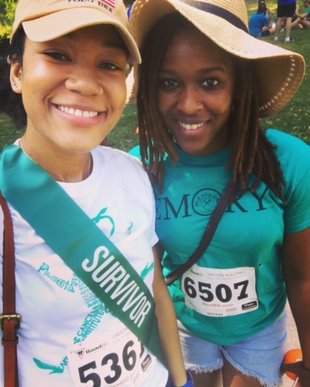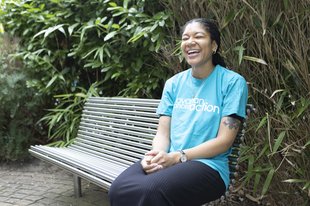Alexandria: ‘I had ovarian cancer, that’s why I’m discovering breakthroughs for other women with the disease’

Alexandria
Alexandria was diagnosed with stage 1 ovarian cancer in 2014, while she was at university studying to become a scientist.
Her experience fuelled a passion to study ovarian cancer research, and improve diagnosis and treatment for other women. It’s been eight years since Alexandria finished her treatment, and she’s now proudly working at our Ovarian Cancer Action Research Centre. Alexandria passed her thesis defence is 2023 and is now has a PHD in cancer studies.
Here she shares her story.
“When my symptoms started I was approaching my final year of university, and a lot of healthcare professionals said the symptoms probably weren't as disastrous as I thought they might be.
I was experiencing some really uncomfortable cramping sensations - I knew that this wasn’t normal for me. I was very, very persistent with the healthcare professionals.
They discovered a cyst on my right ovary which was really big - almost four or five inches. It was after I had surgery to remove the cyst that I was diagnosed with ovarian cancer. When a couple of months later, the pain and cyst came back, they suggested I have a hysterectomy. I was only 20.
I was really curious about my options. I said, I'm going to look in the literature and I'm going to read articles. And then I'm going to come back to you which I'm sure, looking back now, shocked them. I decided I didn’t want to have everything taken out immediately, and that we’d have follow ups to see how I was doing.
I went ahead with the surgery to remove my right ovary for the time being and I had chemotherapy - all just after my 21st birthday and in my final year of university.
I decided to go to chemo five times a week, eight hours a day, having two weeks off and then I would come back and do it again. Looking back now, I’m not sure that was a sensible decision but I was happy. I wanted to get it all over with and finish school.
My journey from patient to scientist
I knew I wanted to pursue ovarian cancer research further in my studies. I had a patient perspective and felt I could see things from a different point of view to other scientists.
By that point, I had worked in laboratory research as a scientist for several years, so I was really curious. In my personal experience, I found that there’s not a lot of information or details given to patients with ovarian cancer because the symptoms can be easily mistaken. I wanted to change this.
After I finished my treatment and graduated, I studied for a PhD in ovarian cancer research and then applied for a position at the Ovarian Cancer Research Centre in London.
I’d heard of my supervisor, Professor Iain McNeish, just from the research that I'd done years before - when I first started learning more about ovarian cancer. And luckily, I got the job! Now have my PhD in Cancer Studies and am officially a Doctor.
I’m so happy to be working at the Ovarian Cancer Research Centre, Europe’s first ever centre dedicated to ovarian cancer research.
It's a really wonderful opportunity to be able to work at the Centre (and I now have my PhD in Cancer Studies and am officially a Doctor). We’re funding research that focuses on prevention, detection and treatment because improvements in each will transform how long and how well women will live. The science we’re doing is groundbreaking, to say the least.
I am working on a device involving patient samples, so that we can test a combination of treatments on patient tissue. We’re hoping to use this research to offer a more personalised treatment for women with ovarian cancer.

Alexandria in an Ovarian Cancer Action t-shirt
Funding breakthroughs in treatment and care
This Ovarian Cancer Awareness Month, I’m also taking part in Walk in Her Name to help fund the life-saving research we do at the Centre and to raise awareness of the disease.
Like thousands of other women, I’m walking 100km in my local area throughout March. I’ve participated in the awareness walks for ovarian cancer in the USA, where I was diagnosed, so it made sense to take part here too.
There is so much to explore and investigate in ovarian cancer research - because it is so historically underfunded.
It’s very expensive to conduct quality research with sterile materials, and reproduce consistent results - due to the cost of everything from pipettes to lab coats to gloves. It’s well worth the expense, if it means that we can bring personalised treatments and better opportunities for people with ovarian cancer.
Together we must accelerate progress, so we can see the same fast and consistent improvements in ovarian cancer as we’ve seen in prostate and breast cancer.”
We’re incredibly grateful for the work that our scientists like Alexandria do. We wouldn’t be saving lives without them.
Can you do something amazing in Alexandria’s name and for women with ovarian cancer? This Ovarian Cancer Awareness Month, join Alexandria and take part in Walk in Her Name 2024.